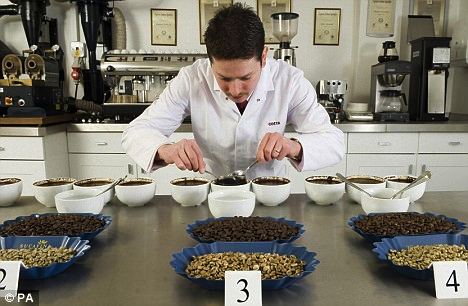It starts with a gong. The sound summons four expert coffee tasters to the cupping table. Talking is not allowed, but the room is far from silent. The analysts slip into something they call the Zen of cupping, taking turns sniffing coffee grounds from Ethiopia, Brazil, Colombia and Kenya, looking for early signs of troubled beans.
"There's very few coffee labs that do what we do," said Spencer Turer, a coffee tasting expert and the vice president of Coffee Analysts.
The Burlington company is the only independent, third party coffee testing lab in North America that's not associated with a wholesale roaster or equipment retailer.
"It's an odd job," Turer said. "There's not too many people in the country, or in the world, who are professional coffee tasters."
"I answered a Craigslist ad for a job here," taster Gwen Toohey said.
Toohey is the newest member of the team. She says two years ago she was your average coffee drinker. Now, she's holding her own in a male-dominated industry. Toohey has a professional background in tea and chocolate, but says the team taught her everything she knows about coffee.
"There's kind of an endless learning curve and I like that," she said. "I like being challenged by it."
The process is scientific and timing is everything. Five cups are used to gauge product uniformity. Each steeps for exactly three minutes. The team smells the wet coffee, noting certain scents, and then skimming off oil, bubbles and grounds. The coffee is not filtered so the tasters can pinpoint defects. After a nine-minute cooling period, the flavor is ready and the process get a bit noisy-- grown adults slurping. It's the only way the coffee hits all of the tongue's taste receptors.
"I am the envy of my friends and family," Turer said. "They say, 'Really, explain to me-- you just drink coffee all day?'"
"Usually I get, 'Wow, I didn't know that existed!'" Toohey said.
The sensory specialists are testing for acidity, body, flavor and finish. The coffee should taste sweet, buttery, nutty, chocolatey or lemony. But earthy, moldy, vinegary or chemical notes indicate a problem. Each cup is slurped several times because quality can change as the coffee cools.
"The biggest challenge is trying to stay motivated when we're dealing with commercial grade coffee," Turer said. "It's part of the job, but it's not something we particularly enjoy. We really like testing specialty grade coffees."
Turer says the team works with national coffee companies, specialty roasters and many brands found on supermarket shelves. They help settle discrepancies when buyers and sellers can't agree on quality, work with coffee traders to write product specifications and help high-end roasters develop special blends.
"Once I started working in coffee professionally, I couldn't see myself doing anything else," Turer said.
That was 21 years ago. Turer started as a cafe manager and barista. Now, he and his team sample up to 200 cups a day. It's no wonder they can't keep it down, spitting out each sip to avoid getting full. They also keep their reactions neutral. Tasters doesn't want to tip off their colleagues and compromise the scientific process. But when you take a swig of rancid coffee, it's a hard rule to follow.
Their work extends beyond this seemingly bizarre ritual to the lab and the borders beyond. Turer has traveled to several coffee-producing countries and worked with the farmers, sharing their passion for the popular commodity.
"Coffee is so exciting," Turer said. "Coffee is a global product."
An odd job ensuring your beloved brew lives up to expectations.
Entry-level coffee tasters make $13-$20 per hour. Those with more experience can earn well over $100,000 per year.

